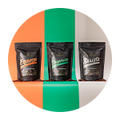Why Marine Collagen Deserves a Spot in Your Daily Routine
Collagen might sound like just another wellness buzzword, but it's actually one of the most abundant proteins in your body—making up around 30% of your total protein content. Think of it as the scaffolding that keeps everything from your skin to your joints feeling strong, supple, and supported. As we age, our natural collagen production starts to dip (we’re talking as early as your mid-20s), and the results can show up as fine lines, joint stiffness, or slower recovery after exercise.
That’s where marine collagen comes in. Derived from fish, it’s known for its high bioavailability—meaning your body can absorb and use it more efficiently than some other sources. And the benefits? Let’s just say they go way beyond skin-deep.
What Makes Marine Collagen So Special?
Marine collagen is made up primarily of Type I & II collagen—the same type found in our skin, bones, and tendons. It’s packed with amino acids like glycine and proline, which play a key role in repair and regeneration. Here’s how supplementing with marine collagen could give your body the boost it's been craving:
Hair, Skin & Nails Glow-Up
Marine collagen can help promote firmer, plumper skin by supporting hydration and elasticity—aka fewer fine lines and more glow. It’s also been linked to improved hair strength and reduced shedding, and it may help strengthen brittle nails. Whether you're chasing that fresh-faced glow or simply trying to keep your hair and nails looking healthy, collagen is your go-to.
Joint & Bone Support
Collagen is a key structural component in cartilage and bone, so it’s no surprise that marine collagen can help reduce joint pain and stiffness, particularly in active individuals or those managing the early signs of ageing. With consistent use, many people report more mobility and less creakiness during workouts (and the days after).
Gut Health Benefits
Some studies suggest marine collagen may help support gut health by strengthening the intestinal lining and promoting the growth of beneficial gut bacteria. That’s a big deal when you consider how closely your digestive system is linked to energy, immunity, and even mood.
Muscle Mass & Recovery
Although it’s not a complete protein, marine collagen does contain key amino acids that support muscle repair—making it a great add-on for those with active lifestyles. Whether you’re lifting, running, or doing Pilates, it may assist with recovery and reduce DOMS.
Skin Healing & Acne Support
Beyond glow, collagen may also play a role in wound healing and reducing the appearance of scars. For those dealing with breakouts or acne-prone skin, marine collagen’s ability to boost skin repair and hydration might help with recovery and resilience.
Do You Need Collagen Every Day?
If you’re over 25, daily collagen supplementation can help counteract your body’s natural decline in production. And if you’re training hard, juggling a busy lifestyle, or not getting collagen-rich foods in your diet (like fish skin or bone broth), supplements make it super easy and convenient to stay on top of your game.
Marine collagen is one of those rare supplements that ticks a lot of boxes—skin, hair, joints, gut, recovery—the list goes on. It’s safe for most people, easy to incorporate into your day, and genuinely effective when taken consistently. Just make sure you’re opting for a high-quality, hydrolysed (aka easily absorbed) formula so you get the most benefit from every scoop or sachet.










